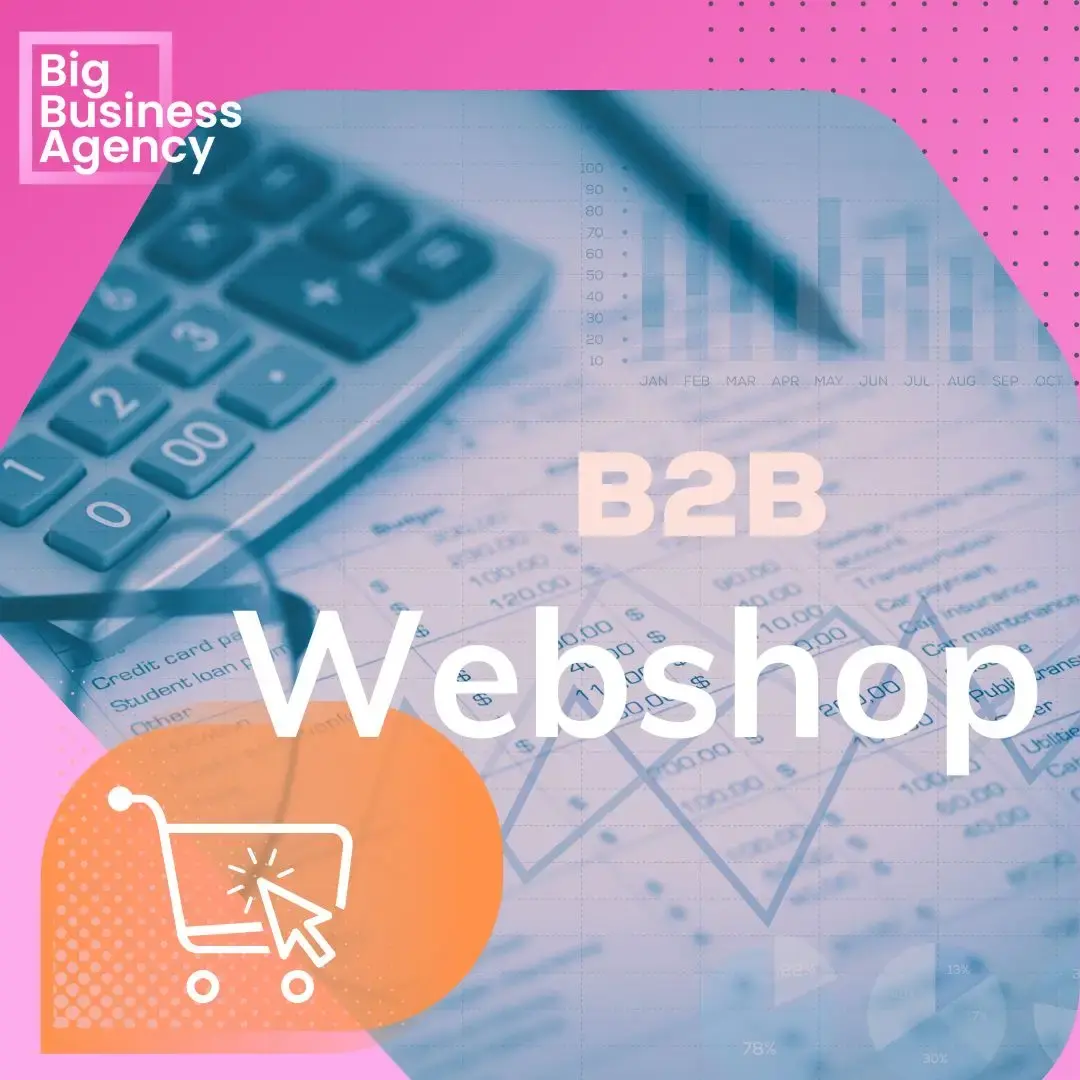2 min read
Why your B2B company needs a webshop
"Online" has become the new normal, fundamentally transforming how we buy and sell. Unsurprisingly, eCommerce is growing so quickly in the B2B...
Contents
Best Shopify Plus Alternatives
Why Consider Shopify Plus Alternatives?
Common Reasons Why Businesses Don't want to use Shopify Plus
What makes CommercePro ideal for HubSpot users?
Key Benefits for Choosing CommercePro over Shopify Plus
CommercePro Features and Pricing
Comparing CommercePro and Shopify Plus: Which is better for HubSpot integration?
Other Top Shopify Plus Alternatives
What to consider when selecting your eCommerce solution


Dive headfirst into our "Shopify Plus alternatives" episode!
With McKinsey reporting that 34% of B2B buying committees prefer eCommerce digital ordering and reordering, it's not a question of "if" but more a question of "when" to upgrade to a purpose-built B2B eCommerce capability.
While Shopify Plus has been a favoured option for larger enterprises, it might not suit every business, particularly as you scale and need greater flexibility and customisation.
With high transaction fees, limited customisation and a dependency on third-party apps, many enterprises can feel constrained.
If you're seeking a solution that more closely aligns with your growth objectives, consider Shopify Plus alternatives that provide enhanced scalability, superior cost-efficiency, and advanced features.
And did we mention it's completely possible to eliminate the need for external resources to maintain your webshop?

When it comes to eCommerce, B2B companies that use HubSpot (for Sales, Marketing, Customer Service, or simply using the HubSpot CRM) have a game-changing opportunity to deploy a solution that seamlessly integrates with their CRM while providing robust eCommerce functionalities. CommercePro stands out as a top choice, merging advanced eCommerce capabilities with HubSpot's powerful data tools.
According to Gartner, AI-driven customer service solutions like those in advanced eCommerce platforms are projected to grow, with 80% of customer interactions handled by AI by 2025 - a significant leap from 20% in 2023.
Further, Gartner explains in their Future of Work Report that this trend underscores the importance of choosing a solution like CommercePro, which is built to meet the demands of an AI-enhanced, data-driven world.
With CommercePro, HubSpot users can maximise customer engagement, personalise experiences, and optimise sales from within a single, integrated platform.

Shopify is an eCommerce platform that enables you to run an online store. With this platform, you can create your own website, manage your products, determine shipping costs, and sell across various channels.
As Shopify is a cloud-based hosted solution, you are not required to maintain the software. This is attractive for many businesses as it prevents the need to hire full-time application support resources.
Shopify caters to both small businesses and large enterprises through its Shopify and Shopify Plus eCommerce plans.
Shopify
Designed for small businesses, it offers three pricing tiers—Basic, Shopify and Advanced - each providing access to various features based on the selected plan.
Shopify Plus
This plan is tailored for enterprise-level businesses. With custom pricing that includes a percentage of revenue and a minimum fee of $2,300 per month, Shopify Plus offers access to enhanced features specifically designed for stores with higher sales volumes.Additionally, while there is no free plan, Shopify does offer Shopify Lite as an option if you want to include a buy button on your existing website or blog. (Note that this version is not typically suitable for B2B users.)
With Shopify’s popularity as a top eCommerce solution, it’s easy to assume it’s the right fit for every online business. However, as some businesses scale or need deeper integration with platforms like HubSpot, Shopify’s high costs and limited customisation can become restrictive, particularly at the Shopify Plus level.
Enter CommercePro - an agile, HubSpot-friendly alternative to Shopify Plus specifically designed to meet the evolving needs of online merchants looking for a flexible, powerful and cost-effective platform.
In this article, we'll explore why CommercePro may be the best choice for you if you're a HubSpot user, along with other top Shopify Plus alternatives.

As your business grows, so does the need for an eCommerce platform that can keep up. While Shopify Plus offers robust features for high-volume merchants, its pricing and certain limitations can be challenging for HubSpot users needing seamless integration. Here are some common reasons businesses look for Shopify Plus alternatives:
Search engine optimisation (SEO) is a crucial component of the marketing features provided by an e-commerce platform. Although Shopify effectively manages basic SEO tasks, you might desire greater control over your website, particularly if you depend heavily on organic search traffic.
For instance, Shopify does not permit users to access and modify robot.txt files. For those who are not familiar, this file instructs Google on how to index your site, ensuring that only the desired webpages appear in search engine results.
Initially, this limitation might not affect you, but as your site expands, you'll likely want more influence over how Google crawls and indexes your website.
One reason is the freedom to select your payment gateway without incurring extra fees. With Shopify, if you opt not to use their own payment system, Shopify Payments (powered by Stripe), you may face transaction fees of up to 2% per sale.
Moreover, by not using Shopify Payments, you lose access to certain features, like the ability to handle transactions in multiple currencies. Additionally, if you sell high-risk products, such as flammable items, you are unable to use Shopify Payments even if you wish to.
Imagine having each individual set of pricing options, bundle options and service options inside a single Customer Portal. If your customers are demanding integrated self service and reordering across a range of channels then its time to shop for an alternative to Shopify.
These constraints aren't suitable for everyone. It's good to know there are other viable options that better suit your business.
CommercePro stands out because it is built inside the HubSpot Portal. It provides an adaptable, affordable, and highly integrative e-commerce solution built with HubSpot users in mind. Here’s why it might be the ideal choice:

CommercePro’s unique advantages for HubSpot users go beyond just pricing. Here are some standout benefits:
HubSpot-Friendly Features: The platform supports detailed customer journey tracking, lead segmentation, and personalised marketing through seamless data flow between CommercePro and HubSpot.
Customisable Checkout Experience: CommercePro provides a flexible, customisable checkout process to tailor the user experience.
Scalability: Like Shopify Plus, CommercePro is built to support high-traffic stores but allows for easier scalability as you grow, with transparent pricing that doesn’t escalate dramatically.
Multi-Currency, Transactional tax and Multi-Language Support: Perfect for international businesses, CommercePro supports multiple currencies and transactional taxes including VAT/GST and Sales and UseTax, making global roll outs easy.
Built-In SEO Tools: CommercePro offers advanced SEO features, customisable URLs, and automatic sitemap generation, giving you control over your site’s visibility.
 Features
Features
CommercePro offers flexible pricing with various plans to fit different business sizes. Starting at a more accessible rate than Shopify Plus, it scales as your business grows without dramatic cost increases. Get in touch to arrange a quote.
While both platforms offer solid eCommerce tools, CommercePro has a clear edge for HubSpot users, thanks to its native integration capabilities and tailored support for HubSpot’s CRM tools.
With CommercePro, users can leverage HubSpot data more effectively than with Shopify's basic integration to drive personalised marketing, segment customer bases, and track customer journeys.
While CommercePro offers a range of features ideal for HubSpot users, several other viable Shopify Plus alternatives exist.
It's important to note that none of the other options are native to HubSpot, which means they do not offer built-in, seamless integration with HubSpot's CRM system.
This lack of native integration can result in additional steps or third-party tools being necessary to achieve the same level of data synchronisation and functionality that CommercePro provides directly.
Consequently, businesses may face challenges in maintaining efficient workflows and ensuring that their eCommerce operations align with their CRM strategies.
We explored platforms that offer comparable features and functionality, along with unique elements that stand out. You might favour a platform with drag-and-drop capabilities or one without a subscription fee.
Regardless of your preferences, our selection of the top Shopify alternatives is cost-effective and packed with features.
Here’s a quick look at how five of the popular options compare.

Features: Known for scalability and integration options, BigCommerce is a popular choice for very large businesses looking for advanced functionality.
Pros: No transaction fees, excellent SEO tools, multi-channel selling.
Cons: Limited free themes and a steeper learning curve.
Best For: Businesses that want a strong SaaS solution with customisation and multi-channel selling options.
Features: WooCommerce is an open-source WordPress plugin that provides a customisable eCommerce solution.
Pros: Large library of plugins, customisable, highly flexible with WordPress sites.
Cons: Requires more technical expertise, costs can add up with plugins.
Best For Businesses already using WordPress need a highly flexible and customisable solution.
Features: Magento offers an enterprise-level eCommerce platform with extensive customisation options.
Pros: Highly scalable, robust feature set, great for SEO.
Cons: High development and maintenance costs, complex setup.
Best For: Large enterprises needing significant customisation and scalability
Features: Shift4Shop offers a feature-rich eCommerce solution with built-in SEO tools.
Pros: Free if using Shift4’s payment processing, strong SEO tools and integrations.
Cons: Fewer theme options and steeper learning curve.
Best For: Smaller businesses that want a low-cost, SEO-friendly platform.
Features: Known for ease of use, Wix provides a straightforward solution for building an online store.
Pros: User-friendly, good range of design options, bundled hosting.
Cons: Limited scalability, fewer advanced e-commerce features.
Best For: Small businesses or individuals looking for an affordable, easy-to-use website builder.

When selecting a Shopify alternative, the primary factor to consider is cost. Although many platforms we’ve examined provide a free plan, they all feature paid plans with different pricing tiers. If you're new to setting up an online store, starting with a free plan can help you understand how the platform functions. However, if you're committed to expanding your business, transitioning to a paid plan will eventually be necessary.
Additionally, consider the fees involved. Does the platform impose both a monthly fee and processing or transaction fees for each sale? Are you required to use a separate payment gateway, or can you utilise the platform’s integrated payment processing? These are crucial questions to address when assessing pricing.
When setting up your online store, it's essential to ensure it appears professional and aligns with your brand. This involves selecting a platform that offers a variety of themes and design options. Platforms like HubSpot, Shopify and Wix provide hundreds of themes to choose from, while others like Squarespace offer fewer themes but greater customisation for your store's design.
Consider the significance of design for your business. If having a broad range of themes is important, a customisable platform might be ideal. If you're comfortable with coding and desire more control over your store's design, an open-source or API platform could be the best fit. With these platforms, you can access platform-provided themes, hire a web designer, or purchase a ready made theme such as those available in HubSpot marketplace.
An essential factor to consider is hosting. Some platforms, like HubSpot, offer hosting as part of their monthly subscription. Others, such as WooCommerce, do not include hosting but facilitate setting up your store using a hosting service like WordPress.
If you're uncertain about which option suits you best, consider how much control you desire over your store's hosting. If you prefer the platform to manage everything, a hosted solution like HubSpot could be ideal. However, if you're comfortable managing your own hosting, a self-hosted option like WooCommerce might be more suitable.
Ease of use is another crucial factor to consider. You need a platform that is straightforward to set up and operate, particularly if you're new to e-commerce. Even if you're experienced and just transitioning to a new platform, check if there’s a migration service or a detailed guide to assist with the transfer. The last thing you want is a platform that is so complicated that it requires weeks or months to master.
Ensure the platform you select supports a variety of payment processing options, including invoicing, credit and debit cards, as well as popular providers like PayPal, Stripe, or Apple Pay.
Additionally, evaluate if the platform offers features such as subscription-based payments or recurring orders. These capabilities can be highly beneficial for businesses that offer products or services on a recurring basis.
 SEO features
SEO featuresTo ensure your store's success, it's crucial to enhance its visibility to potential customers by optimising it for search engines like Google. When assessing a platform's SEO capabilities, look for elements such as an integrated blog, customisable URLs, meta tags and social sharing buttons. These features will aid in optimising your site for search engines and attracting more visitors.
Additionally, consider if the platform provides extra SEO-enhancing features, like the ability to create custom pages or incorporate structured data. These tools can boost your site's search ranking and increase traffic to your website.
Running an online store requires prioritising security to ensure your customers' data remains safe and your store is shielded from cyber threats. To assess security, choose a platform that includes features like SSL encryption and PCI compliance. SSL encryption is crucial for safeguarding customer information, while PCI compliance guarantees your store's protection against hackers.
Additionally, opt for a platform that consistently updates with the latest security patches. This ensures your store remains defended against emerging threats.

When selecting an eCommerce platform, it's crucial to consider customer support. Issues are bound to arise occasionally, and having a dependable support team is essential for resolving them.
To assess customer support, check for features like 24/7 availability, live chat, community forums, email assistance, and a comprehensive knowledge base. These resources ensure you receive timely help.
Additionally, the quality of the support team will be evaluated by reading user reviews to understand their experiences.
For HubSpot users seeking a Shopify Plus alternative, CommercePro stands out as the top choice. It offers seamless HubSpot integration, robust eCommerce features, and a pricing model that scales with your business without the prohibitive costs associated with Shopify Plus.
By choosing CommercePro, HubSpot users can enjoy a tailored experience, advanced customisation and a platform built to grow alongside their business.
 CommercePro is a smart, scalable choice for businesses seeking an adaptable, HubSpot-friendly eCommerce platform.
CommercePro is a smart, scalable choice for businesses seeking an adaptable, HubSpot-friendly eCommerce platform.
If you are ready to take your HubSpot-powered e-Commerce to the next level, CommercePro might just be the perfect solution!
To find out more, get in touch with one of our team for a free, no obligation chat about CommercePro and HubSpot.
CommercePro’s native HubSpot integration and advanced customisation options make it ideal for users who like using HubSpot and rely heavily on HubSpot’s CRM tools.
No, CommercePro does not impose extra transaction fees for using third-party payment processors, giving you flexibility in choosing your preferred payment gateway.
CommercePro offers multi-currency and multi-language support, making it easy to manage global sales.
CommercePro also provides the option for GST, VAT and other taxes that are required in international transactions.
Yes, CommercePro provides access to HTML/CSS for full customisation, allowing you to create a unique brand experience.
CommercePro offers 24/7 support and dedicated account managers for enterprise users to help you get the most out of your e-commerce store.
Yes, there are few free alternatives to Shopify however, they tend to have restrictions that can make them unsuitable for B2B firms. (Note none of them are HubSpot native)
For example Ecwid offers a free plan, but it’s best suited for small stores because you can only have up to five products.
Shift4Shop is another Shopify alternative with fewer restrictions, provided you use its payment processor.
Got questions?
Recommended Reading
Transform your business with cutting edge eCommerce solutions
What is the new HubSpot Service Hub?
Maximising SEO Content with Content Hub
Boost your website performance with HubSpot's free website grader
What are the top internal barriers to growth?


2 min read
"Online" has become the new normal, fundamentally transforming how we buy and sell. Unsurprisingly, eCommerce is growing so quickly in the B2B...

As B2B buyers continue to evolve integrated B2B eCommerce continues to be vital. In fact, the global B2B eCommerce market is projected to reach $20.9...

Nearly 90% of B2B buyers use digital channels as their primary method of identifying and evaluating new suppliers, highlighting the growing reliance...
